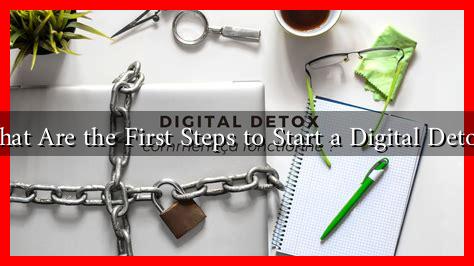-
Table of Contents
What Are the First Steps to Start a Digital Detox?
In an age where technology permeates every aspect of our lives, the concept of a digital detox has gained significant traction. A digital detox involves taking a break from digital devices to reduce stress and improve mental well-being. With studies indicating that excessive screen time can lead to anxiety, depression, and sleep disorders, many individuals are seeking ways to reclaim their time and mental space. This article outlines the first steps to embark on a successful digital detox.
Understanding the Need for a Digital Detox
Before diving into the steps of a digital detox, it’s essential to understand why it’s necessary. According to a report by the Pew Research Center, the average American spends over 11 hours a day interacting with media, which includes smartphones, computers, and televisions. This excessive screen time can lead to:
- Increased stress and anxiety
- Sleep disturbances
- Reduced productivity
- Impaired social interactions
Recognizing these impacts is the first step toward initiating a digital detox.
Step 1: Assess Your Digital Habits
The first actionable step in your digital detox journey is to assess your current digital habits. Take a week to track how much time you spend on various devices and applications. You can use apps like RescueTime or the built-in screen time trackers on smartphones to gather this data. Consider the following questions:
- Which apps consume most of your time?
- How do you feel after spending time on social media?
- Are there specific times of day when you feel compelled to check your devices?
This self-reflection will help you identify patterns and areas for improvement.
Step 2: Set Clear Goals
Once you have a clear understanding of your digital habits, the next step is to set specific, achievable goals for your detox. Goals can vary widely based on individual needs, but here are some examples:
- Limit social media usage to 30 minutes per day.
- Designate tech-free zones in your home, such as the bedroom or dining area.
- Schedule specific times for checking emails instead of constant notifications.
Setting clear goals will provide you with a roadmap for your detox journey.
Step 3: Create a Digital Detox Plan
With your goals in place, it’s time to create a structured plan. This plan should include:
- Duration: Decide how long you want to detox. It could be a weekend, a week, or even a month.
- Activities: Plan alternative activities that do not involve screens, such as reading, hiking, or engaging in hobbies.
- Accountability: Share your goals with friends or family who can support you during this process.
Having a well-thought-out plan will make it easier to stick to your detox.
Step 4: Gradually Reduce Screen Time
Instead of going cold turkey, consider gradually reducing your screen time. This approach can help ease the transition and make it more sustainable. For example:
- Start by reducing your screen time by 15-30 minutes each day.
- Replace one hour of screen time with an offline activity.
- Use apps that limit your access to distracting websites during certain hours.
Gradual reduction can help mitigate withdrawal symptoms and make the detox process more manageable.
Step 5: Reflect and Adjust
After completing your digital detox, take time to reflect on the experience. Consider the following:
- How did you feel during the detox?
- What challenges did you face?
- What changes do you want to implement moving forward?
This reflection will help you adjust your digital habits for the long term, ensuring that you maintain a healthier relationship with technology.
Conclusion
A digital detox can be a transformative experience, allowing individuals to reconnect with themselves and the world around them. By assessing your digital habits, setting clear goals, creating a structured plan, gradually reducing screen time, and reflecting on your experience, you can successfully navigate this journey. Remember, the aim is not to eliminate technology entirely but to cultivate a balanced relationship with it. As you embark on your digital detox, keep in mind that small, consistent changes can lead to significant improvements in your overall well-being.

